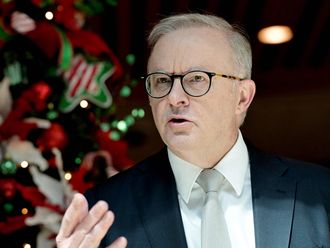Bratislava: A leftist party led by one of the few leading politicians in Slovakia has been propelled back into power in an early parliamentary election, according to final results on Sunday.
Smer-Social Democracy of former Prime Minister Robert Fico is a clear winner with 44.4 per cent of the vote, or 83 seats in the 150-seat Parliament, with votes from all 5,956 polling stations counted.
The result allows Fico to govern alone — one party rule has not happened in Slovakia since the split of Czechoslovakia in 1993.
Yesterday, he offered opposition parties a chance to join forces and form a two-party coalition government, but all other parliamentary parties rejected that. Before the election, Fico discussed a necessity to create a strong, stable government, possibly formed by two parties, amid another economic downturn and efforts to save the Eurozone.
Fico — considered a populist leader — has pledged to maintain a welfare state, increase corporate tax and hike income tax for the highest earners.
"We succeeded with what we offered as an alternative," Fico said early on Sunday. "We've achieved a result that is a pleasant surprise for us, to be honest."
Corruption scandal
The outgoing centre-right, four-party coalition received a combined 51 seats, on the back of voter anger over a major corruption scandal.
The new Ordinary People party that campaigned on an anti-corruption ticket won 16 seats, while the ultranationalist Slovak National Party, known for derogatory comments about ethnic Hungarians, Roma and political opponents, ended below the 5 per cent threshold needed to win parliamentary representation.
Turnout was surprisingly high at 59.11 per cent. Analysts had predicted a record low turnout, as voters were expected to register their anger over allegations that a private financial group bribed government and opposition politicians in 2005-06 to win lucrative privatisation deals.
The "Gorilla" files — posted online by an anonymous source in December and said to be based on wiretaps — have rocked Slovak politics. One former economy minister is said to have received the equivalent of €10 million (Dh48.17 million) for his assistance.
Outgoing Prime Minister Iveta Radicova's Slovak Democratic and Christian Union was hard hit by the allegations. Radicova's party was in power in 2005-06.












